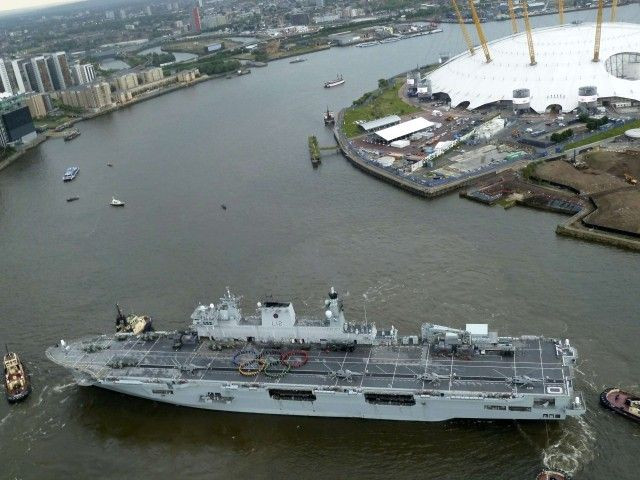Welcome To Fortress London, Your Destination For The 2012 Summer Olympics (Hold for AM, review)

Enjoy your time in London for the 2012 Olympics. The organizers have taken all measures to ensure that your stay will be a safe one -- perhaps the safest in Olympic history.
In what is likely to be the most security-conscious Olympics in memory, British authorities are leaving nothing to chance to provide security for the capital.
Eleven miles of electric fencing, charged with 5,000 volts of electricity and topped with razor wire for good measure, cordon off the Olympic site. The entrances to the major venues are guarded by soldiers, the streets outside patroled by heavily armed police carrying automatic weapons -- a rare sight in Britain, where police often do not carry firearms.
And there are plenty of boots on the ground. Tens of thousands of security personnel have been marshaled for the event: 12,500 police, 17,700 soldiers (including 5,500 outside the city), and 7,000 contract security workers.
One of the Royal Navy's largest warships, the 21,500-ton HMS Ocean helicopter carrier and amphibious assault ship, will be located downriver from central London. It will serve as a staging post for military helicopters, some carrying snipers and special forces personnel ready to take out dangerous elements. A Type 45 stealthy next-generation destroyer, one of the world's most advanced warships, is also parked on the Thames.
In the city itself, six missile sites have been dedicated to intercepting any hostile aircraft, likely to be low-flying, slow and small aircraft if coming from terrorists. Rapier and Starstreak surface-to-air missiles have been put in place to down any airborne threats.
Not that any ill-intentioned pilots would even be able to get to the city before they are blown away. In the skies above and around London, advanced fighter jets are patrolling the skies. At least four Eurofighter Typhoons, the most advanced aircraft developed by the European Union, are enforcing a strict no-fly zone around London.
Any aircraft that has not been pre-authorized or is not a commercial flight will find itself squarely within the sights of numerous air, water, and ground-based systems.
It will be the first time since World War II that anti-aircraft weapons and fighter planes have been placed in London.
But the forces protecting civilians, athletes and visitors to London will also be smart. E-3D Sentry aircraft, which house powerful electronic sensor suites, will be used to coordinate forces from the sky. Unmanned drones will be flying around the city to provide surveillance for security forces. Helicopters with powerful imaging equipment will be able to peek down and identify faces, clothes, even the color of the shoelaces on any suspect individuals. And down in the streets thousands of cameras will feed data to face-recognition software used to pick out any known hostiles from the crowds.
Other countries are pitching in too. Hundreds of specially picked CIA, FBI, and Interpol officers will be onsite to help Scotland Yard coordinate and assess the security environment.
The entire bill for the security apparatus: $877 million.
Not everything has gone smoothly. Private security contractor G4S, the world's largest, came up short in personnel to meet its requirements for the Olympics, for which it originally would have been paid $440 million, much of that now going back to the British government.
On Wednesday, Secretary of State for Culture, Olympics, Media and Sport Jeremy Hunt, the man in charge of security preparations for the games, told BBC Radio that G4S has goofed in its responsibilities. Hunt said that executives at G4S "didn't know what was going on" in the runup to the games.
In the aftermath of the revelation of shortcomings from the company, the British military called up nearly 5,000 additional troops to take on security roles.
Security preparations for the games have been give wide publicity, since organizers feel knowledge of the massive defenses protecting the Olympics will work to deter terrorists or criminal groups from attempting any violent actions.
The face of Olympic security in London will be unabashedly militarized: security concerns have trumped any consideration of political correctness.
The militarization extends in part to the Olympic pageantry. Back in 2009, the Royal Air Force's aerobatic team, the Red Arrows, was thought to have been left out of the Olympic ceremonies due to its overtly military background, which might have disturbed some participating nations. But then the decision was made to keep their display in.
Residents of buildings where missiles have been located have also gone to court to demand their removal from their housing, arguing that their placement made their apartments a terrorist target. The court ultimately ruled for keeping the installations in place for the duration of the games.
© Copyright IBTimes 2024. All rights reserved.





















